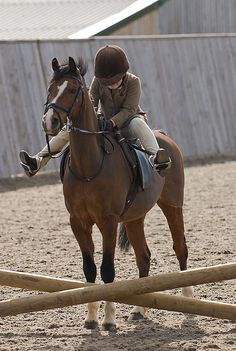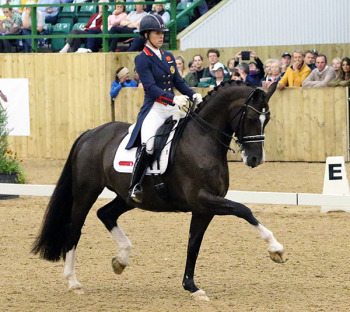Dealing with criticism and gossip mongors
Posted on
Dealing with criticism and gossip mongors
Having been involved in equestrianism now for over 35years, and being a professional for over 20, I've been on the receiving end of both positive and negative comments made by people.
How did these comments affect me and did it have an impact on me as a professional? The simple answer to this is yes and no, on both accounts.
When I was young and starting out on my own as a trainer, I wanted to be the best, doesn't everyone? I spent a very long time studying other trainers and riders, watching how, why, when they did what they did to achieve what they did, either with their riding or their training, sometimes sitting in on lessons for days on end, notepad and pen taking notes. I think I may have been a pain to some trainers, as I would question (at appropriate moments obviously) why they chose an exercise, or what the response they felt after riding a certain movement, but I was never chastised for it, just a gut feeling of "oh no, she's here again!" But those early days served me well, I gave up my own time to educate myself, which has never failed me.
Why does this have bearing on this blog? Well, having studied the trainers who were getting results with their own horses, and seeing the results their clients were achieving, coupled with studying for, and passing my own exams, I built up a solid foundation of knowledge which I still fall back on all these years later, albeit some methods have changed and as new knowledge is developed those methods are tailored to the here and now, ensuring that training methods I use today are matched to the horse or client in question.
But what about THIS blog??
Ok, so this blog is supposed to be about criticism and gossips yes? Yes, however I think it's important to look at why criticism or gossip happens in the first place, that way it helps you understand why you may have it, sadly, aimed towards you personally.
Over the years I have trained countless riders and horses, and "onlookers" have witnessed a huge variety of methods I used. The problem is, those onlookers had no idea of:
- Where the horse started out in its training
- How much, or little the rider knew
- What the relationship to that particular days training was to the overall training
- Where the horse is CURRENTLY in its training
- Whether the horse or rider or the combination were having an "off day" if the onlooker witnessed something other than pure harmony, which is obviously highest on the list, but sadly often not the case when that "off day" occurs
- What the lesson goals are for that particular days work, e.g. Watching a rider simply stretching their horse when the onlooker "knows" that rider has a competition in a couple of days time and deems the chosen work to be ineffective, yes it did and still does happen(!)
I could list a few more, but I think you get my drift here?!
So, these "onlookers" have now made an assumption that what I am doing is wrong, therefore they go tell their friend, who tells their friend and so on, and the Chinese whispers grow. Funny how these "onlookers" are never around to see, and spread the news, when the horse goes well or the riders are achieving their goals eh?!!
Anyway, in the early days it hurt to be honest, I knew what I was doing was right, perhaps not perfect, even now I sometimes think back to riders who had difficulties with certain things and I will be teaching someone going through a similar experience and think oh if only I knew about this method back then, but hey, that's life, knowledge grows with experience, however when I would hear bad things being said I would quite often question my own abilities to do what I loved, and on one occasion was met with some incredibly hurtful criticism and for a short while I didn't teach as it had caused me great distress, however after time to evaluate the comments made, which I still replay every now and again in my head, I knew I couldn't not teach, its what I do (!) and actually it all turned out to be pure jealousy, which is quite often the root cause of criticism anyway.
Very rarely would you hear anything positive said, and back then you didn't have the likes of twitter or Facebook (actually internet, wow I'm THAT old !) so it was incredibly hard to "promote" yourself. The horses I rode, owned and trained were never world beaters, but they were all I had, and as mentioned, with no way to "promote" myself it was down to good old fashioned hard work and determination to prove myself by training these horses to the very best of mine, and their ability, which could be showcased at competitions, which were few and far between when finances were little and costs high, but I did the best I could.
Leaping forward to now, I don't feel there is any change in people's opinions, in fact now we have the internet, I feel people are now much nastier as they can hide behind their keyboards and slate people in the safety of their home, but I'd say the tongue is still a very destructive thing and Chinese whispers are very much still alive and, sadly, all too familiar.
So how do I deal with negative criticism? The simple answer is nowadays I listen to it, and think for a moment why those people have said what they have and unless their in any justification for it, I ignore it, mostly it is actually laughable, as I know my training is justifiable, I welcome people to sit in on lessons should they wish, (clients obviously informed and asked first!) or ask questions, either as I did all those years ago, or comment on things I share on my social media pages to gain an insight into what I'm doing and why.
Obviously positive criticism is to be enjoyed, but sadly their is a shortage of positive people in the world, so spreading bad news is far more satisfying for some people, a sad state of affairs really.
In conclusion, over the years of building knowledge and never allowing myself to stop learning, has meant that I can be positive about criticism, even when it really hurts, and use it to push myself harder to learn more and become a better trainer, and person, from it. Such a shame the gossip mongers don't apply the same principles really...

